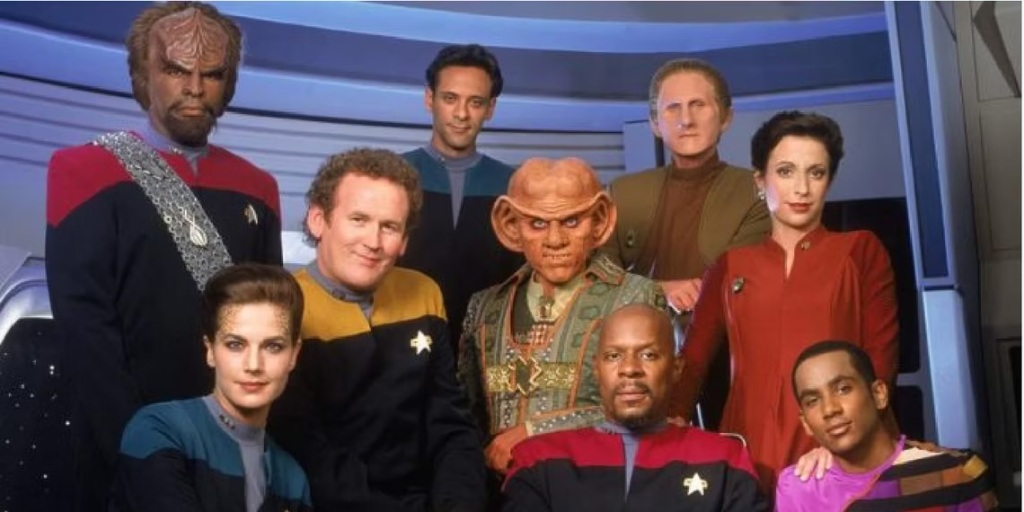I recently started rewatching Star Trek: Deep Space Nine for the first time in many years. What a fantastic show, so engaging from the start. The series looks at what happens when the Federation assists the recently liberated Bajoran people in operating a space station that was once a work camp run by brutal Cardassian occupiers. I always felt, even back in the day when I watched new episodes of DS9, that the Bajorans were heavily Palestinian-coded. In the context of Israel’s current genocide in Gaza, this show presents a very compelling story of how communities recover from systematic murder and exploitation, including all the political turmoil that follows.
It’s a gripping and sometimes disturbing show, and yet I cannot help the fact that it often lulls me to sleep. It’s the Star Trek-ness of it that gets me. I have a long history of falling into the deepest slumber while watching these programs. It started when I was a kid who hated both Star Trek and naps. It always seemed to happen on a Sunday afternoon. One of my older brothers would get a hold of the TV dials and say, “Ooh, Star Trek’s on!” And I’d say, “Ew, I hate that show. It’s boring!” And then they’d say, “There’s nothing else on, just dumb sports,” which was usually true. And before I knew it, there would be Spock and Captain Kirk on our screen, with all those strange bee-boop spaceship sounds in the background. I would try to get into the story, try to care about whatever green woman Kirk was romancing in that episode. But I just couldn’t. And then the bee-boop sounds would start to get me. Suddenly I’d feel my eyelids getting heavy and then I’d drift away into the most placid snooze…until I was inevitably awoken by the siren sound of that insane woman humming over the end credits music. My eyes would pop open, I’d see the Desilu Productions credit on the screen, and then I’d be filled with a groggy rage. Tricked into yet another nap by the dullest TV show in the world!
I’ve maintained a pretty bad attitude about naps over the years, but my opinions about Star Trek have changed drastically. I started watching The Next Generation reruns as a teen and got hooked. That’s when I learned you didn’t need to be a science nerd to love Star Trek. You can be a budding socialist who dreams of a better future where exploration replaces militarism, money doesn’t exist, machines create all the food and other necessities you need, and women in authority are called “sir.” I began watching reruns every night. Eventually I got into Deep Space Nine, particularly after TNG’s Worf joined the series in season 3. When both series started getting released on DVD in the early 2000s, my boyfriend would bring home the box sets as soon as they popped up at the used record/video store where he worked. Being able to binge an entire season at my leisure felt like such a dream.
Of course now I can stream all of the series in their entirety, which is truly a beautiful thing. But something about catching a random episode on TV always felt like such a joy. When my husband and I moved to Chattanooga in 2010 and he’d just started his first job post-grad school, one of my great low-budget delights was watching the 11pm nightly TNG rerun that came in on our digital antenna. One evening my husband noted, “Tara, you never make it through the episode. You just fall asleep on the couch every night.” But what a comforting way to drift off! Those soothing white noise background sounds from the bridge, coupled with Patrick Stewart’s gorgeous accent and stately cadence, felt like a security blanket. Moving to a new town 600 miles away from everything I knew was really scary! I didn’t know what this isolated Appalachian city had in store for me. But I knew exactly what would happen aboard the Starship Enterprise, because I’d already seen every episode. It didn’t matter if I fell asleep.
Drifting off to DS9 is a different experience, because I haven’t watched in a long time and don’t often remember what happens at the end of each episode. I do know that its harsher storyline becomes quite complicated as the series progresses. TNG was a series of many standalone stories in which justice usually prevailed. DS9 takes a darker, more nuanced view of its various humanoid species, and even the Federation itself. I don’t want to miss what happens in any story, so I find myself scrolling back to the last scene I can recall before the bee-boop sounds of the space station lulled me to sleep. Like I’ll wake up to some intense, climax-building music and think, “Oh my god, did one of the main characters just die?!” And then I have to skip back to the crazy twist that makes it all make sense. Honestly this sort of show shouldn’t be soothing in the least. Part of it’s the bee-boops. Part of it’s that I’m just getting sleepier as I age. And maybe part of it is that in 2024, the DS9 deep trauma vibes feel way more real than TNG’s utopian atmosphere. Perhaps there’s some comfort in that familiarity.


